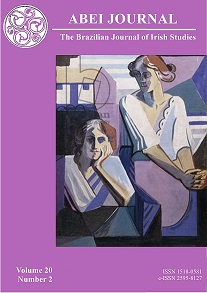Pondering from Celia de Fréne's Works: Literary Genres and Sexual Gender at Stake
DOI:
https://doi.org/10.37389/abei.v20i2.3201Abstract
How can we go beyond historically constructed gender differences, as we read literary genres in the contemporary Irish context? In order to start finding responses to these questions, we aim at looking into how selves are constructed and identities represented as we read Celia de Fréine’s works. Indeed, concepts of identity in postmodernity, represented selves and literary genres, particularly related to the recent Irish literary context are fundamental points of convergence in the understanding of feminisms and literature today. Therefore, this article intends to show how fixed concepts of gender identity and literary genres are, in fact, unstable in contemporaneity. The paralleled, theoretical notions (of gender and genres) matter in the Irish context, because, apart from a few exceptions, women have been excluded from the public literary scene and many of the poets that appeared after the 1970’s account for their condition as women in a patriarchal society. Moreover, it matters due to the proximity of both cases’ unstable condition in our times.
Keywords: Contemporary Irish poetry; literary genres; gender; contemporaneity.


